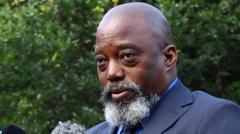Former Democratic Republic of Congo President Joseph Kabila has made a significant return to the nation after two years spent in South Africa. His arrival, particularly in the rebel-held city of Goma, has fueled renewed political drama and debates regarding his past associations with the M23 rebel faction, which has been accused of seizing Congolese territory with support from Rwanda.
Kabila's return comes in the wake of a scandal wherein senators stripped him of immunity due to alleged support for the M23. The former president vehemently denied any involvement with the group and claimed that the current justice system was being manipulated for political purposes. A spokesperson for the M23 welcomed Kabila, stating he should have "full access to the country," framing his presence as a homecoming for a father figure.
However, Kabila faces serious accusations from the Congolese government, which has accused him of war crimes tied to the M23's activities. Government spokesperson Patrick Muyaya dismissed Kabila's criticisms of the administration, asserting that he has "nothing to offer."
Kabila's political career spanned 18 years, following in the footsteps of his father, Laurent Kabila, who was assassinated in 2001. After stepping down in 2019 to President Félix Tshisekedi, their relationship soured, particularly as conflict erupted again between the Congolese army and the M23—an insurgent group that re-emerged in 2021. The resurgence of violence within the mineral-rich eastern regions of the country has resulted in significant civilian displacement and suffering.
As Kabila returns, the political landscape in the DRC remains fraught with uncertainty and unrest, as calls for democratic reforms and peace in the region grow louder.
Kabila's return comes in the wake of a scandal wherein senators stripped him of immunity due to alleged support for the M23. The former president vehemently denied any involvement with the group and claimed that the current justice system was being manipulated for political purposes. A spokesperson for the M23 welcomed Kabila, stating he should have "full access to the country," framing his presence as a homecoming for a father figure.
However, Kabila faces serious accusations from the Congolese government, which has accused him of war crimes tied to the M23's activities. Government spokesperson Patrick Muyaya dismissed Kabila's criticisms of the administration, asserting that he has "nothing to offer."
Kabila's political career spanned 18 years, following in the footsteps of his father, Laurent Kabila, who was assassinated in 2001. After stepping down in 2019 to President Félix Tshisekedi, their relationship soured, particularly as conflict erupted again between the Congolese army and the M23—an insurgent group that re-emerged in 2021. The resurgence of violence within the mineral-rich eastern regions of the country has resulted in significant civilian displacement and suffering.
As Kabila returns, the political landscape in the DRC remains fraught with uncertainty and unrest, as calls for democratic reforms and peace in the region grow louder.


















